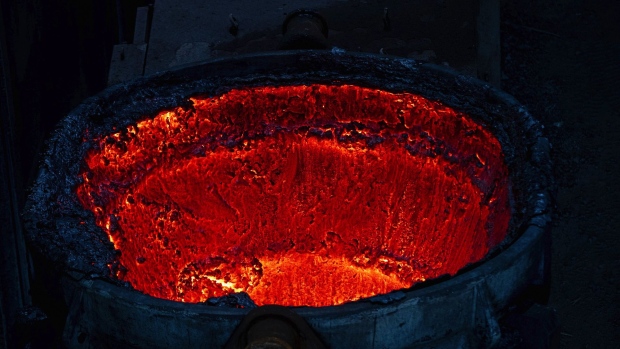Aug 11, 2022
Thyssenkrupp Lowers Profit Outlook After Rising Rates Hit Steel
, Bloomberg News

(Bloomberg) -- Thyssenkrupp AG lowered its full-year profit forecast after rising interest rates triggered a writedown at the German company’s steel division.
The engineering giant said Thursday it now sees net income in the high triple-digit million-euro range for 2022, below its previous projection of at least 1 billion euros ($1.03 billion).
Thyssenkrupp made some progress improving operating profitability. Adjusted earnings before interest and taxes surged to 721 million euros in the fiscal third quarter, bolstered by rising sales and higher steel prices. That’s more than double the result from a year earlier, but still below analyst estimates.
Once synonymous with German industrial prowess, Thyssenkrupp is attempting to haul itself out of a years-long slump. Boom times for the steel industry over the past 12 months have helped steady the company’s finances, although rising costs for energy and raw materials are squeezing margins. Thyssenkrupp booked impairment losses of 480 million euros in the period because higher interest rates weighed on its operations.
Thyssenkrupp rose 1.4% as of 9:21 a.m. in Frankfurt, reversing earlier declines of as much as much as 3%. The shares are down around 38% this year.
The engineering giant’s steel unit requires millions of euros in annual investment to maintain its Duisburg plant, which is the largest such facility in Germany. As well as blast furnaces, the site contains major shipping and rail infrastructure for the transport of raw materials and finished steel products.
Outlook Confirmed
The conglomerate stuck to its other guidance metrics, and still expects full-year adjusted earnings to improve to at least 2 billion euros before interest and taxes, helped by ongoing cost cuts.
Thyssenkrupp also maintained its expectation for negative cash flow in the mid-three-digit million-euro range. That’s below the break-even level anticipated before the company’s guidance was withdrawn in March following Russia’s invasion of Ukraine.
The company’s management team led by Chief Executive Officer Martina Merz has turned free cash flow into a yardstick to measure its turnaround progress.
“A return to a sustained positive free cash flow before M&A -- on a full-year view -- remains our priority goal,” Chief Financial Officer Klaus Keysberg said. “We are confident that we will achieve this through the systematic realization of our transformation and the continuous structural improvement of our businesses.”
(Updates with shares in fifth paragraph. A previous version of this story corrected the currency conversion in the second paragraph.)
©2022 Bloomberg L.P.






